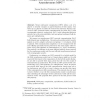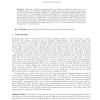576 search results - page 23 / 116 » Modeling Adversaries in a Logic for Security Protocol Analys... |
ASIACRYPT
2009
Springer
14 years 2 months ago
2009
Springer
Multi-party secure computations are general important procedures to compute any function while keeping the security of private inputs. In this work we ask whether preprocessing can...
LOPSTR
2001
Springer
13 years 12 months ago
2001
Springer
In this paper we define a sequent calculus to formally specify, simulate, debug and verify security protocols. In our sequents we distinguish between the current knowledge of prin...
CARDIS
2008
Springer
13 years 9 months ago
2008
Springer
We investigate an application of RFIDs referred to in the literature as group scanning, in which several tags are "simultaneously" scanned by a reader device. Our goal is...
ASIACRYPT
2007
Springer
13 years 11 months ago
2007
Springer
Secure multi-party computation (MPC) allows a set of n players to securely compute an agreed function of their inputs, even when up to t players are under the control of an adversa...
EUROCRYPT
2004
Springer
14 years 28 days ago
2004
Springer
Informally, a public-key steganography protocol allows two parties, who have never met or exchanged a secret, to send hidden messages over a public channel so that an adversary can...



